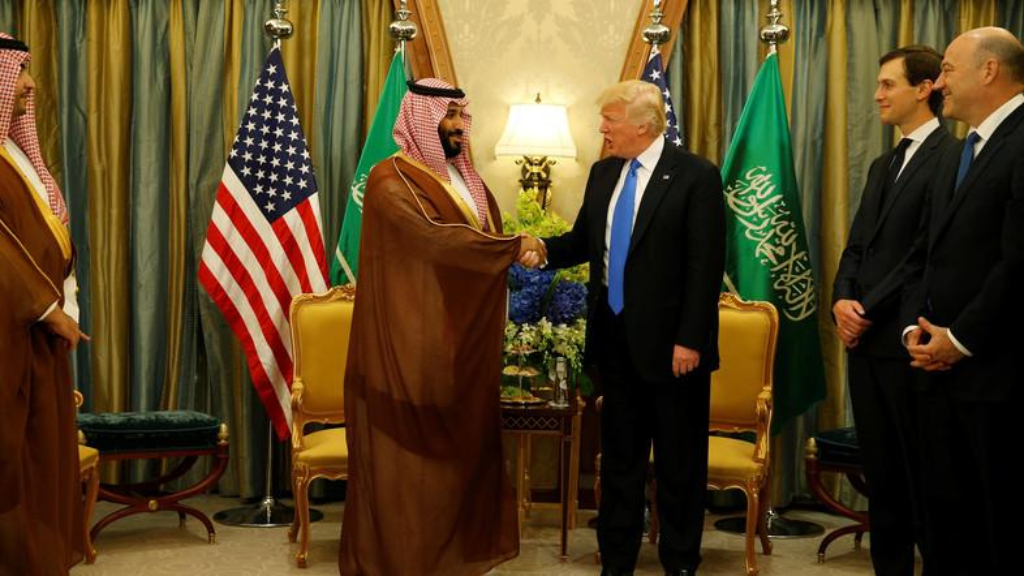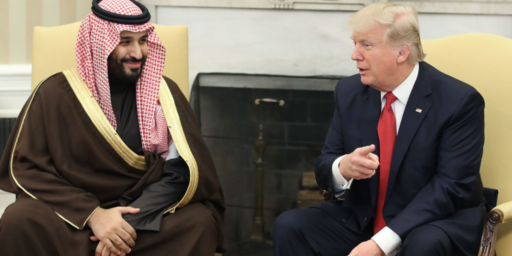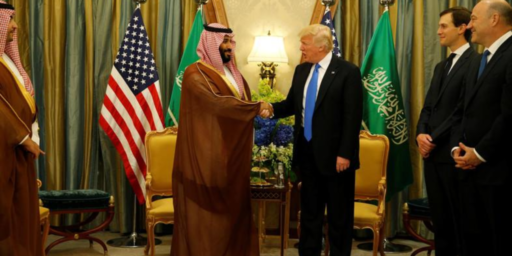Senate Overwhelmingly Repudiates Trump On War On Yemen, Khashoggi Murder
In a small, but meaningful, step, the Senate has rebuked the Administration's policies toward the Kingdom of Saudi Arabia.

In a remarkably united move yesterday, the U.S. Senate essentially repudiated the Trump Administration’s official position on the death of Jamal Khashoggi and also voted to end U.S. support for the Saudi war on Yemen:
WASHINGTON — The Senate voted resoundingly on Thursday to withdraw American military assistance for Saudi Arabia’s war in Yemen, issuing the latest in a series of stinging bipartisan rebukes of President Trump for his defense of the kingdom amid outrage in both parties over Riyadh’s role in the killing of a dissident journalist.
The 56-to-41 vote was a rare move by the Senate to limit presidential war powers and send a potent message of official disapproval for a nearly four-year conflict that has killed thousands of civilians and brought famine to Yemen. Its immediate effect was largely symbolic, after the House earlier this week moved to scuttle it, all but assuring that the measure will expire this year without making it to Mr. Trump’s desk.
But the action signaled a growing sense of urgency among lawmakers in both parties to punish Saudi Arabia for its role in the brutal killing of the journalist Jamal Khashoggi, and to question a decades-old bipartisan tradition of Washington averting its gaze from human rights abuses and other wrongdoing by the kingdom in the interest of preserving a strategically important relationship in the Middle East.
Senators also approved, by a voice vote, a resolution to hold Crown Prince Mohammed bin Salman, the heir to the kingdom’s throne, personally responsible for Mr. Khashoggi’s killing. The nonbinding measure also calls on Saudi Arabia to “moderate its increasingly erratic foreign policy” and urges an end to American air-to-air refueling of bombers operating in Yemen.
The United States stopped refueling Saudi warplanes operating in Yemen last month; the resolution would keep the Pentagon from restarting that support.
With the moves, senators were breaking forcefully with Mr. Trump, who has maintained steadfast support for Saudi Arabia and Prince Mohammed, even though the C.I.A. has concluded that he directed the grisly assassination of Mr. Khashoggi inside its consulate in Istanbul in October.
Mr. Trump dug in on that position on Tuesday in an interview with Reuters, saying he was standing by Prince Mohammed despite the C.I.A.’s findings, and saying the crown prince was “very strongly in power” in Saudi Arabia.
“I absolutely believe that if the crown prince came before a jury here in the United States of America, he would be convicted guilty in under 30 minutes,” Senator Bob Corker, a Tennessee Republican who heads the Foreign Relations Committee, said on the Senate floor on Wednesday. “I absolutely believe he directed it. I believe he monitored it. And I believe he is responsible for it.”
Senators in both parties described the measures as direct responses to the refusal by Mr. Trump and his administration to hold Saudi Arabia to account for Mr. Khashoggi’s death, and a way to counter the president’s own statements that the money to be made from arms sales to the kingdom was enough to justify turning a blind eye to such a deed.
“We cannot sweep under the rug the callous disregard for human life and flagrant violations of international norms the Saudis are showing,” said Senator Robert Menendez of New Jersey, the senior Democrat on the Foreign Relations Committee.
“Saudi Arabia has joined a sinister clique along with North Korea, Russia and Iran in its assassination of Jamal Khashoggi,” Mr. Menendez said. “A few more weapons purchases cannot buy our silence. It should not buy our silence, and if the president will not, Congress must act.”
The votes came only hours after Defense Secretary Jim Mattis and Secretary of State Mike Pompeo implored members of the House of Representatives during a closed-door briefing to continue the military advising, logistics support and intelligence that have for years been shared with Saudi Arabia.
Some lawmakers emerged from the House meeting frustrated that Mr. Pompeo and Mr. Mattis had defended the United States’ relationship with the kingdom, which the White House needs to counter growing Iranian influence in the Middle East.
In terms of the actual impact on American support for the war on Yemen or our relationship with Crown Prince Mohammed bin Salman, this resolution is not likely to have any significant impact beyond its symbolic meaning. The primary reason for this is that Speaker of the House Paul Ryan has made it clear that the House will not be voting on the measure even though it seems clear that there is sufficient support for the measure among a coalition of House Republicans and Democrats in favor of both the Yemen War resolution and the resolution regarding the murder of Jamal Khashoggi. Additionally, even if it did pass both chambers of Congress, the President would most likely ignore it and assert that his independent authority as Commander in Chief and chief diplomat were superior to Congressional resolutions on either matter.
Despite this, as Daniel Larison notes, there is something important about the resolution that ought to be recognized and which, hopefully, could lead to a subsequent action in the new Congress when the House of Representatives is controlled by Democrats:
The Senate’s passage of S.J.Res. 54 today was historic in several respects. It was the first time the Senate used the War Powers resolution to oppose ongoing U.S. involvement in a foreign war, and it was the first time in decades that the Senate repudiated a war involving the U.S. against the wishes of the sitting president. U.S. support for the war on Yemen has been a bipartisan policy that spans two administrations, but it is such a despicable and outrageous policy that it mobilized a bipartisan coalition to vote to end it. There are few other issues that could unite Tea Party conservatives, democratic socialist independents, and progressive Democrats in common cause, but the war on Yemen and our role in enabling it have done exactly that. S.J.Res. 54 challenges decades of Congressional acquiescence to illegal presidential warmaking, and it set a precedent by defining hostilities to mean everything up to and including the refueling of other governments’ air forces in wartime. The WSJ is scoffing at the resolution, but I suspect they are actually terrified of what it portends for the future of Congress’ role in matters of war and the prospects for the success of war opponents in the next Congress. The Trump administration and the Pentagon trotted out all of the usual nonsense arguments in favor of continued U.S. involvement and the Saudi relationship, and the Senate dismissed their pathetic excuses. It would have been easy for most senators to fall in line and take the easier path of deferring to the executive as members of Congress almost always do, but instead they did the more difficult and right thing for U.S. interests and peace in Yemen.
As for the Khashoggi resolution, while that was rather toothless given the fact that there’s little that the Senate itself can do about American policy toward Saudi Arabia, Aaron Blake is correct to point out the significance of the fact that the entire Senate repudiated the Trump Administration on this issue:
[The resolution is] saying that the U.S. government needs to be on the record with moral clarity — moral clarity that Trump and company simply haven’t provided. It would be one thing for Trump and Pompeo to say that Mohammed did it but that it’s not worth retaliation; they’ve gone further by covering up the amount of certainty that exists about his role.
The ball is in the House’s court. We pretty much know it won’t pass the resolution calling for pulling out of Yemen, but it could join in rebuking the Trump administration on the crown prince. If it does so, the bill would go to Trump’s desk, where he would have to decide whether to keep pretending that the intelligence doesn’t say what it says — and potentially risk more blowback from Congress, including perhaps sanctions.
Ultimately, this could also just be a momentary, symbolic rebuke — the kind that passes just as quickly as it comes along. Perhaps senators will think they’ve done enough now, and they can move on.
But to be clear, they all just shined a spotlight on the Trump-led coverup of Khashoggi’s killing, and they did it with one voice. That’s pretty remarkable on an issue of such import and involving such an important ally.
The question going forward is whether Congress would be willing to go further than this on either the Yemen War or Khashoggi issues. With respect to the first, the fact that Congress controls the powers of the purse means that it could, if it wanted to, insert language into the budget resolution barring the President and the Defense Department from providing any aid of any kind to Saudi Arabia’s war on Yemen. While this would be an atypically assertive role for Congress to take, it would be something totally within the powers of Congress to do. The Senate could also seek to further sanction the Saudis by cutting off all foreign aid, military and otherwise, to the Kingdom regardless of whether or not it is related to the War On Yemen. Finally, Congress could impose sanctions under the Magnitsky Act against the Kingdom of Saudi Arabia generally and the Crown Prince and those close to him specifically and President Trump would be obligated to impose them notwithstanding the fact that he and his Administration continue to kiss up to a regime whose de facto leader is a murderous thug.






There were 7 Republican Senators who crossed the aisle to vote for this: Senators Collins, Daines, Flake, Moran, Lee, Paul, and Young.
It should be a repeatable experience, but we’ll see.
Not passed by both Houses of Congress? No filibuster-proof majority? No veto-proof majority?
Totally meaningless. A few Republican Senators get free publicity for breaking with the President on a vote they know meant absolutely nothing, and everyone else voted along party lines. Color me unimpressed.
The important thing here is that all but 7 Republican Senators either have no problem with Trump’s relationship with KSA or are too spineless to voice their opposition. Sad. Pathetic. Low Energy.
Sen. Graham gets additional minus points for being too spineless to take a position at all.
Five corporate-lovin’ Dembots helped Paul Ryan put language into a farm bill blocking a vote on the ongoing mass-murder in Yemen.
Gee, who wouldn’t want to vote for that party.
As I thought about it, I realized that Democrats are so moral, so ethical and so intellectually superior than their neanderthal Republican opponents, surely they’ll want to exact a price from the corporate-lovin’ murderbots in their own party who voted to make sure the killing continues; so here they are:
Jim Costa
Al Lawson
Collin Peterson
Dutch Rupperberger
David Scott
Let me hear you roar, Dems!